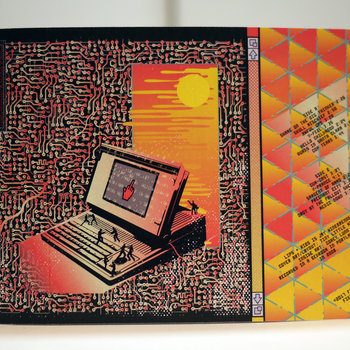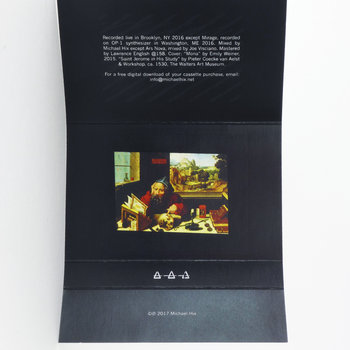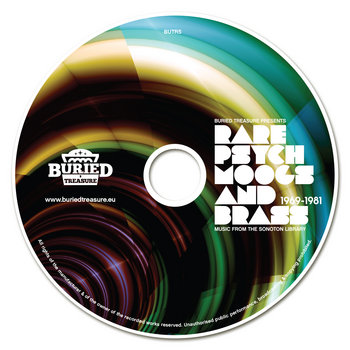
Welcome to Hi Bias, a monthly column highlighting recent cassette releases on Bandcamp, and exploring the ideas behind them with the artists who made them. Rather than making sweeping generalizations about the “cassette comeback,” we prefer here simply to cover releases that may escape others’ radar due to their limited, cassette-focused availability.
Lips and Ribs, Males In Harmony [Field Hymns]






Cassette




On his new tape Males In Harmony, Jay Winebrenner—aka Lips and Ribs—concocts hyper electronic jams that sound like B-movie soundtracks pumped full of helium. Winebrenner found inspiration not in other music, but, as he puts it, “muscular movie villains” such as Matt Cordell (played by Robert Z’Dar in Maniac Cop), the Night Slasher (played by Brian Thompson in Cobra), Ivan Drago (played by Dolph Lundgren in Rocky IV), and Fender Tremolo (played by Vincent Klyn in Cyborg). “I’ve always has an obsession with masculine ‘80s hero culture stuff,” says Winebrenner. “I think that it’s pretty apparent in the music, with the over the top-iness of it all.”
Movies also guide the ideas behind specific songs on Males In Harmony, which evoke action, adventure, and slasher films. The rippling “Medic Down” has a bombastic drive that Winebrenner says “rips off Philip Glass’s ‘epic’ vibe.” “I always pictured some grizzled war hero cliché running in slow motion through a battle field when I listen to it,” he adds. “If Oliver Stone ever gets the opportunity to remake Platoon, I really hope he gives me a call.”
On the rollicking “Pregnant City,” Winebrenner imagines an inverse of Children of Men where everyone is pregnant. “I would probably insist on a dance number like the ‘Twist and Shout’ scene in Ferris Bueller’s Day Off, except everyone is pregnant,” he says. “The choreography wouldn’t be as playful; it would be more of a military-like march. I’m trying to think of who would be a good director for this concept, but it’s not coming to me. I don’t think Michael Bay could pull it off.”
Clearly Winebrenner has a sense of humor, but Males In Harmony isn’t just some big joke. The music is well-crafted and texturally dense, with too much happening to be all absorbed in one listen. “I think there is a delicate balance to this project where the music has the potential to come across as zany and I do not want that,” Winebrenner says. “That’s a trait in music I rarely find appealing.”
Males In Harmony was created entirely with MIDI, an oft-maligned technology by which Winebrenner pre-programs sounds into a keyboard, then plays, records, and manipulates them. “Many musicians see it as some kind of sacrilege,” he says. “I don’t, although admittedly there is a hollowness to MIDI tones in general. I’d much prefer to make music with an array of vintage analog synths, but that is a deep, dark, and expensive abyss.”
Instead, Winebrenner accepts and takes advantage of the limits of MIDI. He says one of his goals for Males In Harmony was “to transcend the inherent shittiness of the tone and try and make something worthwhile.” In the process he created songs that feel more surreal than cheesy, more psychotic than robotic. Take “Cop Tears,” with its skull-banging arsenal of rattling beats and bleating horns. “[The title] came to me as I, for whatever reason, thought the imagery of tough, masculine cops weeping to this shitty MIDI horn music was funny,” says Winebrenner.
Winebrenner has played music all of his life, but has little formal training. All he can recall is one guitar lesson “from this hesher dude named Dean who took a swig off of a Jack Daniels bottle every other minute,” he says. “I’ve tried to find him on social media out of curiosity, but…the search came up fruitless. So if by miracle Dean is reading this now, please get in touch. Maybe we can jam on some 12-bar blues.”
The music on Males In Harmony sounds like it could be a blast in person, but Winebrenner has yet to attempt live performance. “I don’t have the charisma to push play and dance around like an imbecile,” he says. “I’ve fantasized about playing it live with a full band, [but] I’d need a full brass section, two keyboardists, an organist with a B3 preferably, a shredding drummer, and I’d play the bass. That’s what daydreaming is for, I suppose.”
Michael Hix, Pneuma [Willows Music]






Cassette




The active, evolving instrumentals concocted by Michael Hix take enough twists and turns that it’s easy to assume he’s telling wordless stories. But Hix declines to ascribe narratives to the tracks on his new tape, Pneuma. “I do think the music has a certain perspective, though,” he explains. “To me, it investigates the human condition: What is the nature of being? How does one make sense of suffering? Is there an end to suffering? What brings true happiness? It’s hard not to think in these terms in our current geopolitical climate, and to me these questions come through in the music. I would call the album a musical attempt to create stillness within a world in crisis.”
Those are lofty ideals, but the music on Pneuma lives up to Hix’s musings. Each of the tape’s 12 tracks has an inquisitive tone that suggests sky-high searching for and deep digging into what makes the world turn. That grounding is due in part to the simplicity of Hix’s instrumental setup. “The songs were all composed for three hardware synths and recorded live without the use of any overdubs,” he says. “I set these limitations to force myself to work within the confines of the three synths, which I found were quite sonically vast.”
There definitely is a wide range of tones and textures on Pneuma, often even within single tracks. Its songs are filled with forward motion and wrapped in evocative one-word titles like “Mysterium,” “Elevation,” and “Mirage.” “I think the songs are all looking at the same thing from different angles,” he suggests. “I tried not to give too much weight to the titles but to perhaps convey a bit of the particular cadence of each song, almost like color tones.”
The title of the tape itself, Pneuma, does hold specific significance for Hix in its simplest meaning: breath. “Breath is something insubstantial, always in flux, but it is also the source of life, the ground of being,” Hix explains. “Sound is also transient in this way, yet it rests in silence which is an eternal idea. So I chose Pneuma as a title because I think it represents my approach to sound on the album, which is to always show change and impermanence and to highlight silence.”
Hix’s path toward music began when he was a child. “My dad would go to Nashville every week to record demos of his songs in these big studios on Music Row,” he recalls. “I would go with him sometimes and sit there in awe watching the whole process.” At age 12, Hix took up guitar and joined rock bands; in college, he gravitated toward jazz and classical while also discovering the work of William Basinski. “His unique musical language through which he can create these vast soundworlds [has] been a huge inspiration,” Hix explains.
Moving forward, Hix hopes to make his music “more spare, incorporating more silence and space”—perhaps even recording it in a big church rather than his own home studio. “I think ultimately I am interested in creating a sort of meditational or sacred space in my music, one that reflects an inner landscape and operates on the level of myth,” he concludes. “That’s the music I enjoy listening to most and the kind I’d like to make.”
Alan Sutcliffe, EMS SYNTHI AKS IMPROV 1972-1973 [Buried Treasure]




Cassette


Pioneering computer artist Alan Sutcliffe studied under Daphne Oram, worked with Delia Derbyshire, and created animation for Ridley Scott’s legendary 1979 film Alien. EMS SYNTHI AKS IMPROV 1972-1973 compiles audio work created in his own studio with “pianola, three modified Brenell reel to reel tape recorders, various percussion, pots, pans, gongs, and other sound sources.” Its six tracks present a bubbling mix of electronic sounds that feel both contemporary and timeless. Some of it is space age gurgling in the vein of Raymond Scott and other pieces sound like warped echoes of classical music. The 14-minute “Slideshow” winds through noise, musique concrete, and Cagean indeterminacy to create a mini-universe of unpredictable sound.
Subroutine, Head Crash [Phinery]


It’s hard to pinpoint the sound sources used by the duo Subroutine on their new tape Head Crash—and even harder once you know what they are. England-based Robin Hayward plays microtonal tuba, while his partner, Norwegian-born Morten J. Olsen, uses a rotating bass drum. Yet Head Crash lives in an abstract space where sound seems a distant relative of the tools that created it. The tape’s three tracks are pure texture and atmosphere, hovering primarily in the low-end of the sonic spectrum but filled with small, subtle details that have huge impact. The result is a surprising range of mood, from the calm of near-silence to the shock of tactile noise.
Grant Evans, Seeking Fragrance [Adversary]



Cassette

In his duo Quiet Evenings and on his own as Nova Scotian Arms, Grant Evans has forged a dense body of work. But the music made under his own name for the past few years might be his most interesting. The two 11-minute tracks on Seeking Fragrance cover lots of sonic ground without ever shifting arbitrarily just for the sake of variety. On “In the Heart of Time,” he moves from rhythmic clicking to heavy drone, mixing in an array of accents and elements along the way. But it’s the second track, “Three Dandelions,” that fully stuns. Slipping wavy tones beneath patiently-plucked acoustic guitar, Evans conjures entire worlds with just a few simple choices.
—Marc Masters







